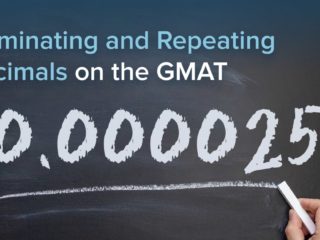Last Updated on May 3, 2023
GMAT OFFICIAL GUIDE PS
Solution:
Since actually dividing 1/(2^3*5^7) would be time consuming, we want to manipulate d so that we are working with a cleaner denominator. The easiest way to do that is to multiply d by a value that will produce a perfect power of 10 in the denominator. This means that the number of 2s in the denominator will equal the number of 5s in the denominator.
Thus, we can multiply 1/(2^3*5^7) by 2^4/2^4. This gives us:
2^4/(2^7*5^7)
2^4/10^7
16/10^7
16/10,000,000
We can stop here because we know that the 10,000,000 in the denominator means to move the decimal place after the 16 seven places to the left. The final value of d will be 0.0000016. Note that the division of 16 by 10,000,000 did not produce any additional non-zero digits. Thus d has 2 non-zero digits.
Answer: B


